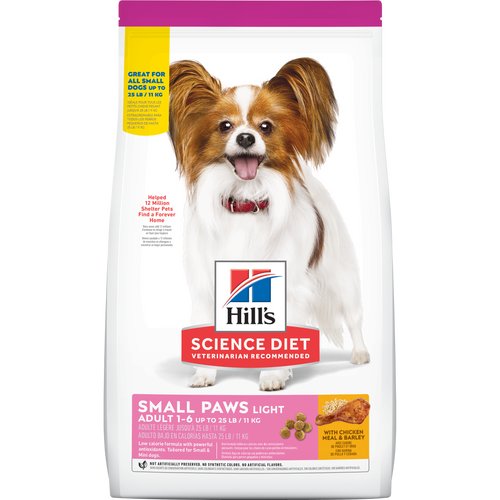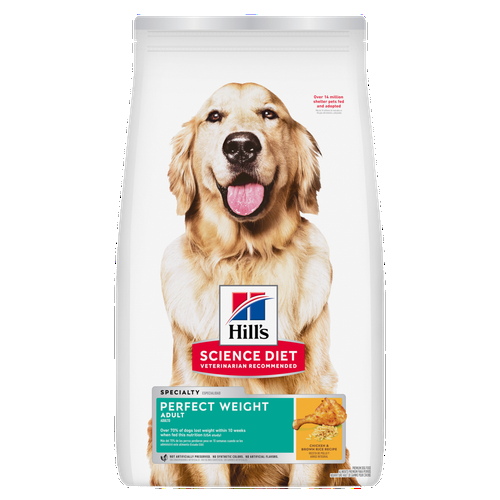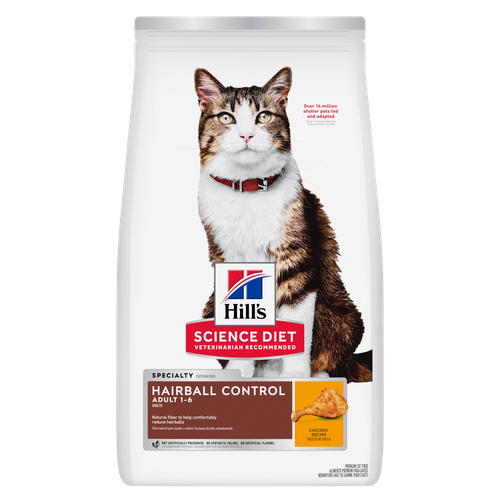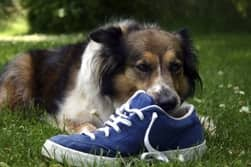
-
Find the right food for your petTake this quiz to see which food may be the best for your furry friend.Find the right food for your petTake this quiz to see which food may be the best for your furry friend.Featured products
 Hill's Science Diet Adult Oral Care Chicken, Brown Rice & Barley Recipe Dog Food
Hill's Science Diet Adult Oral Care Chicken, Brown Rice & Barley Recipe Dog FoodClinically proven kibble technology to reduce plaque & tartar build-up
Shop Now Adult Perfect Digestion Salmon, Whole Oats, and Brown Rice Recipe Dog Food
Adult Perfect Digestion Salmon, Whole Oats, and Brown Rice Recipe Dog FoodScience Diet's breakthrough nutrition supports ultimate digestive well-being & healthy microbiome
Shop Now Adult Light Small Paws with Chicken Meal & Barley Dog Food
Adult Light Small Paws with Chicken Meal & Barley Dog FoodLow calories for less active small & mini dogs
Shop NowFeatured products Adult Perfect Weight Chicken Recipe Dog Food
Adult Perfect Weight Chicken Recipe Dog FoodOver 70% of dogs lost weight within 10 weeks when fed this nutrition (USA Study)
Shop Now Adult 7+ Chicken Recipe cat food
Adult 7+ Chicken Recipe cat foodSupports energy level and beautiful fur in mature cats
Shop Now Adult Hairball Control Chicken Recipe Cat Food
Adult Hairball Control Chicken Recipe Cat FoodNatural fiber to help comfortably reduce hairballs
Shop Now -
Dog
- Dog Tips & Articles
-
Health Category
- Weight
- Food & Environmental Sensitivities
- Urinary
- Digestive
- Joint
- Kidney
-
Life Stage
- Puppy Nutrition
- Adult Nutrition
- Senior Nutrition
Cat- Cat Tips & Articles
-
Health Category
- Weight
- Skin & Food Sensitivities
- Urinary
- Digestive
- Kidney
-
Life Stage
- Kitten Nutrition
- Adult Nutrition
Featured articles How to Reduce Your Pet's Carbon Paw Print
How to Reduce Your Pet's Carbon Paw PrintHeaded outside? How you and your pets engage with nature can affect the environment, so here are some quick tips for reducing your pet's carbon paw print.
Read More Moving With a Pet: A How-To Guide
Moving With a Pet: A How-To GuideDiscover helpful tips for moving with your pet including safety recommendations to keep in mind on moving day & pet behavior to watch for at your new home.
Read More Keeping Pets Calm During Thunderstorms
Keeping Pets Calm During ThunderstormsIs your dog scared of thunder? Does your kitty dart under the bed at the first rumble? Learn a few tips for keeping your pets calm during the storm.
Read More -


Dogs’ mouths function much like our hands. It’s their preferred tool for exploring surroundings. This means that your dog will frequently examine something interesting by tasting and gnawing it.

With some dogs this chewing becomes a destructive problem, and correcting it is part of providing the best dog care.
Dogs chew for a variety of reasons:
- A puppy may chew because of teething
- It can occur out of boredom or because of instinct
- It may be a result of anxiety if your dog is uncomfortable with the surroundings or because of being left alone
Identify the cause. The key to stopping the behavior is identifying the reason for the chewing:
- Chewing on a wide variety of objects in the house regardless of whether you are home is probably the result of boredom. Your dog probably needs more play, exercise and physical activity to work off some energy. Providing appropriate chew toys will also help kick the chewing habit.
- Separation anxiety can be the cause. Dogs may chew or paw to try to escape the area where left or may chew on inappropriate objects as a nervous reaction to your absence. This is a difficult type of chewing to treat because it occurs when you’re not present, and it is the dog's anxiety that needs to be treated. Dog behaviorists will use socialization, desensitization and counter-conditioning techniques to cure separation anxiety. Ask your veterinarian if your dog would benefit from being referred to a veterinary behaviorist.
Apply discipline correctly. Unfortunately, the only time you can effectively discipline your dog for chewing is when you catch it in the act. If you find a chewed-up shoe an hour after the deed is done, your dog won’t be able to associate punishment with the act of chewing. Your dog may seem guilty when you wave the shoe in front of its face, but this is just submissive behavior as a reaction to you.


Tasty Tips
Catch your dog in the act. When you do catch your dog chewing, stop it with a verbal command or a loud noise. When your dog stops, provide a chew toy. When your dog starts chewing on the toy, provide praise and positive reinforcement.
Chew toy choices vary. It is also important to choose the right type of chew toy. Never give your dog an object that looks like something you don’t want chewed. If you provide shoes or clothes, your dog won’t be able to understand the difference between them and appropriate objects.
Use deterrents. Products are available that can be applied to household objects to discourage your dog from chewing them. These products have a taste or smell that is unpleasant (but not harmful) to dogs but not offensive to humans.
As always, consult your veterinarian for additional advice and suggestions.
Also consider reading:


One of our staff authors prepared this article for you
Related products

For the unique nutritional needs of mature Small & Mini Dogs

Clinically proven kibble technology to reduce plaque & tartar build-up

Low calories for less active small & mini dogs

Science Diet's breakthrough nutrition supports ultimate digestive well-being & healthy microbiome
Related articles

Your dog's coat and skin are a big part of your dog's overall health. Ensure you keep your dog's coat healthy, by following these simple tips.

Proper nutrition for your pregnant or nursing dog is vital to her and her puppy's health. Learn what you should do provide her with the proper nutrients.

Understand the role that Omega-6 and Omega-3 fatty acids play in your dog's overall health, and how you can ensure they are getting enough.

Learn about Hill's puppy food and the nutritional benefit & high quality ingredients that it contains for your pup.

Put your dog on a diet without them knowing
Our low calorie formula helps you control your dog's weight. It's packed with high-quality protein for building lean muscles, and made with purposeful ingredients for a flavorful, nutritious meal. Clinically proven antioxidants, Vitamin C+E, help promote a healthy immune system.
Put your dog on a diet without them knowing
Our low calorie formula helps you control your dog's weight. It's packed with high-quality protein for building lean muscles, and made with purposeful ingredients for a flavorful, nutritious meal. Clinically proven antioxidants, Vitamin C+E, help promote a healthy immune system.

